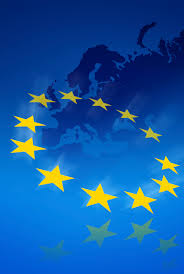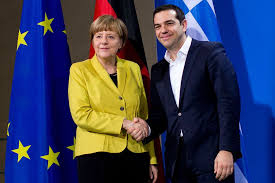As the situation in Greece comes to its dramatic conclusion, the news is full of stories which, I believe, point to problems that are much deeper and more serious than Greece’s fiscal deficit and debt repayments.
Five Major Problems
 While European leaders fret about the money lent to Greece by European bankers, there are at least five major problems that, in my view, are much more important.
While European leaders fret about the money lent to Greece by European bankers, there are at least five major problems that, in my view, are much more important.
- Pope Francis‘ encyclical on the environment, which I tried to summarize last week, reminds us of the most important issue facing Europe and humanity in the long term.
- More immediately we still have an enormous immigration crisis on the shores of Europe which is crying out for a solution and as argued by my colleague, Sebatian Reiche, perhaps welcoming immigrants and refugees would help stimulate the european economy as well as be true to the values for which Europe was created in the first place.
- In Eastern Europe, the United States has announced that it will pre-position tanks and other heavy weapons in in order to re-assure the Baltic States and Poland that they will not be left alone to face a newly aggressive Russia which seems intent on continuing to destabilize Ukraine. Sensing weakness, Vladimir Putin has also held two meetings with the Greek Prime Minister, Alexis Tsipras, in the last few months clearly in a clear indication that Russia seeks to profit from the current crisis in Greece.
- South of Europe, the Middle East and North Africa is falling into one of its most unstable and dangerous periods in history with the rise of the so called Islamic State, war in Yemen and an increase in terror attacks, such as the horrific events in Tunis, France, and Kuwait on Friday last week.
- Besides the rise of Syriza in Greece, various movements on the left and the right have emerged in different member states as a result of a perceived failure of the traditional parties. As outlined in a post a few weeks ago, I believe this is due to a lack of compelling vision in the European project and the perception that the collection of politicians in business suits that we see in European meetings is out of touch with the people and that European democracy needs to be refreshed.
Democracy in Action

A few months ago, the President of Iceland, Ólafur Ragnar Grímsson, made a speech at IESE in which amongst other things he spoke about the referendum he called in 2011 to ask the people of Iceland their opinion about using public funds to guarantee two Icelandic banks which had gone bankrupt. According to President Grímsson, his European colleagues were convinced that letting the banks fail would bring ruin to the Icelandic economy but he decided to over rule the Parliament and go directly to the people.
The vote in Iceland was 59.8 % against the guarantee and the Icelandic economy appears to have recovered from the financial crisis despite the gloomy predictions at the time. In his remarks, President Grímsson also made a vague reference to the situation in Greece and gently suggested that the will of the Greek people be consulted about how they wanted to get out of the current predicament.
Work the problem, people
 My former students will recall then I often start a case study discussion by asking the class, “What is the problem?” and this is where I believe European Leadership is simply on the wrong track. Of course there needs to be a solution to the Greek debt and its balance of payments but is this issue, which is relatively small and only economic, really the most important thing that Europe’s leaders should spend their time on these days? Will an eventual return of the Dracma and a possible exit of Greece from the EU help with any of the five problems mentioned above?
My former students will recall then I often start a case study discussion by asking the class, “What is the problem?” and this is where I believe European Leadership is simply on the wrong track. Of course there needs to be a solution to the Greek debt and its balance of payments but is this issue, which is relatively small and only economic, really the most important thing that Europe’s leaders should spend their time on these days? Will an eventual return of the Dracma and a possible exit of Greece from the EU help with any of the five problems mentioned above?
How about re-assuring Greeks that Europe, as a whole, cares for them and respects their sovereignty and honors their history as the birthplace of democracy? The response to the upcoming referendum has been highly negative from European leaders as they are convinced that the “no” vote, requested by Tsipras, will prevail.

Perhaps European leaders would do better to use this week to articulate the case to their own electorates and the people of Greece to explain why Greece and Europe will be better off together and find some common ground.


I think part of the problem is also Greece and the Greeks. They had set up in a surreal world in which bribery to get anything was the order of the day and which looked normal that a staff member retires at age 45. This is completely unaffordable for any country.
Thanks for the comment!
I do not question the negative judgement concerning the way Greece manages its affairs. For a great summary, by the way, read my friend, Eduardo Martínez Abascal’s blog on the issue (https://blog.iese.edu/economics/2015/07/03/crisis-in-greece-updated-summary/) Although I must confess to more Keynsian leanings than Eduardo, his arithmetic is always correct.
To make the idea I am trying to make clearer, imagine that in a condominium there is a neighbour who has not paid their fees in a year but has just bought new smart phones for their kids and plays loud music all time. Meanwhile, the building has serious structural problems that need repair. Should the other 27 neighbours delay repairing the building until someone can get this one family to behave according to everyone else’s value structure? Should every meeting of the condo association be taken up with this one topic?
My guess is that the “no” vote will win today and that Tsipras will go to Brussels on Monday and come back with a slightly better deal that will be considered a victory for all sides. After that, perhaps Europe’s leaders can get on with more critical issues!
The referendum has not benefited Greece in any way and bankruptcy is still on the horizon.
Thanks for the comment. While the final agreement may not be better than what was offered before the referendum, Tsipras calls it a “growth package” and perhaps the referendum will make it easier for him to approve it.